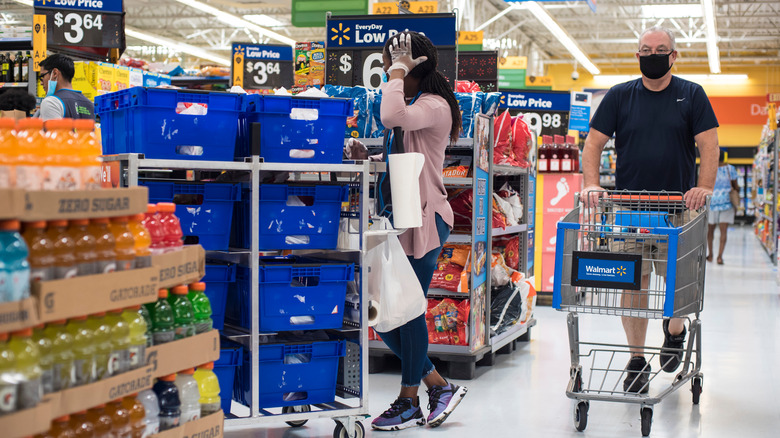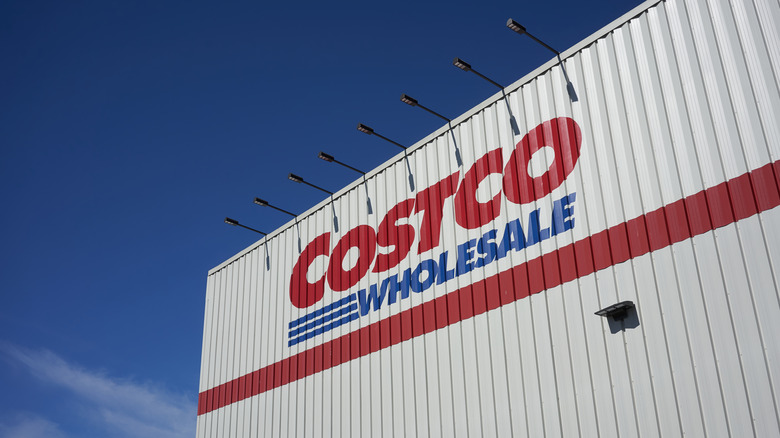Your Local Walmart May Be Temporarily Closing. Here's Why
Residents of Lynn Haven, Florida woke up on July 25 to learn that their local Walmart would close. That is, their local Walmart would close early on Sunday and reopen on Tuesday after a deep clean.
The company explained in a statement shared by the Panama City News Herald that in an effort to address the recent rise in coronavirus cases, "we have chosen to temporarily close our Lynn Haven store. This will allow extra time for a third-party specialist to further sanitize the store and will also give our associates additional time to restock shelves and prepare the store to once again serve the community." After the clean, the Lynn Haven store will continue to administer "employee health assessments" and require unvaccinated workers to wear face masks.
Eat This, Not That notes that many Walmart stores across the country have undergone such a process as of late. This isn't the first time: these deep cleaning closures also happened in December 2020 and May 2021. But as Business Insider notes, Walmart closed 22 of their stores permanently in 2019, so those who see their Walmart suddenly closing, even if it is only for cleaning, have some reason to feel concerned. While it appears that many of the recent closures are simply for cleaning and sanitization purposes, permanent closures always seem to be looming.
This is what the temporary closures entail
While Walmart has not shared more information on how they are deep-cleaning and sanitizing the stores that are temporarily closed, some information is known. According to Eat This, Not That, the store locations that close do so for just two days. The stores typically close in the afternoon around 2:00 p.m. and remain closed. The stores then re-open at 6:00 or 7:00 a.m. after the sanitization has taken place.
This procedure has taken place most recently at two Florida locations, one in Jacksonville and another in Panama City, as well as in Claremore, Oklahoma, and Pagosa Springs, Colorado. Walmart explained that the closures are made "on a market-by-market basis." So, there's little warning or clues as to which location could be temporarily closed next, which is unsettling to many customers. While a two-day temporary closure might seem insignificant to some Walmart customers, it can be very impactful to others.
Walmart is the primary grocer in some communities
Eat This, Not That covered a Walmart closure in Paragould, Arkansas that happened just before Christmas 2020. "They could've warned us a little bit. This is going to hurt this little town," one resident expressed to a local news station. That sentiment raises the larger question of how these closures are affecting communities that depend on Walmart stores, especially smaller communities. Even larger cities like Charlotte, North Carolina rely on Walmart as the number one grocery retailer (via Charlotte Observer).
While there are other grocery stores in the area that consumers can reach, Walmart's size and accessibility means these closures can still be disruptive. According to the Institute for Local Self-Reliance, Walmart cashes in on 50% of grocery sales in the markets of 43 cities and 160 smaller communities. Out of the 203 markets they studied, Walmart dominates with 70% of the market share in 38 of the communities. Putting these numbers into perspective shows just how much people rely on Walmart for their groceries, among other needs. It's no wonder people feel shocked or upended when their local store unexpectedly closes.
A return to familiar safety measures
Walmart is not the only big brand still engaging with the reality of the pandemic. Costco has decided to not eliminate their senior hours, a policy instated at the beginning of the pandemic that gave higher-risk demographics (senior hours also include disabled or immunocompromised people) a safer time to shop. "Instead of discontinuing, we'll maintain hours for seniors Tuesdays and Thursdays, until further notice," Richard Galanti, Costco's chief financial officer, informed USA Today earlier this month. Previously, the wholesale store had planned to end their senior hours on July 26.
While perhaps not as drastic as Walmart's tidying blitz, the decision to not cut the senior hours at Costco offers a further illustration of how even as many are eating inside restaurants and traveling again, we are still living in pandemic conditions. This is especially true as the COVID-19 Delta variant gains greater traction in the country, reminding us that while the vaccines work in lowering the odds of infection, they do not eliminate the risk of infection altogether, and, most importantly, that the virus is still a concern.



